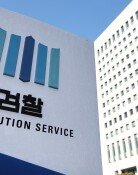New Hiring Practices for Government Posts Open Up
New Hiring Practices for Government Posts Open Up
Posted April. 30, 2003 22:27,
President Roh Moo-hyun pledged that the government would promote measures to recruit talented civil servants through more open and diverse methods. Little progress has been made in that there are still considerable obstacles for non-government persons to gain posts in the new participatory government. Against this backdrop, the government is planning to come up with countermeasures to tackle the issue.
“The government should break down barriers that exist in the personnel management system,” President Roh told officials during a visit to the Civil Service Commission in January. “We need an open and transparent personnel management system that can be applied to the public and private sectors, the academia, and even the political community.”
The government adopted an “Open Competitive Position System (OCPS)” to attract more competent non-official civilians to the government in 2000. Currently 139 positions at Grade 3 or higher in 40 government organizations have been designated as open competitive positions for the selection of applicants to certain positions.
Since the inauguration of the current government in February 2003, a total of 9 public officials have been selected through the OCPS. However, only 3 out of 9 came from the private sector. The remaining six were already in government organizations.
From the year 2000 to the end of February 2003 during the Kim Dae-jung administration, a total of 182 persons were employed through the OCPS. Only 22 persons out of the total 182 were civilians, which means the rate of non-government persons was only 15.8 percent of the total. However, among those non-official civilians who had been selected as public officials through the OCPS, only eight extended their contracts with the government.
Experts point out that the major reason for the OCPS failing to take root in the government personnel management system is reluctance on the part of heads of government organizations and inappropriate designation of open competitive positions.
An official at the Civil Service Commission cited the appointment of the first female and ordinary citizen to head the equal employment office at the Labor Ministry as a successful case.
“The most important thing is a willingness on the part of all heads of government organizations to attract more talented civilians to government agencies,” said a government official. “They should abandon their collective selfishness.”
However, the OCPS still remains a formality in some government agencies because pre-determined appointees to particular posts are still subject to the open system.
In addition, jobs designated as open competitive positions are concentrated in important government offices, so non-government persons are sometimes inappropriate to assume such posts. Another reason for the OCPS to be established is that the rigidity of the Korean labor market makes it difficult for civilian-turned-government officials to return to the private sector after they finish their terms.
In order to encourage more participation and better performance of those from the private sector, several measures are currently under consideration. Several measures include extended contract terms, a scouting system, periodical vacancy announcements, etc. Furthermore, new appointees will provide orientation programs in order to reduce unnecessary instances of trial and error upon entering their new working environments.
Minister of Government Administration and Home Affairs Kim Doo-kwan said: “The ministry will change the OCPS to attract more talented civilians to government posts by easing the inflexible structure of government organizations as well as the level of compensation.”
Hyun-Doo Lee ruchi@donga.com



![“한동훈, 정치생명 걸고 무소속 출마해 평가받는 것 고려할만”[정치를 부탁해]](https://dimg.donga.com/c/138/175/90/1/wps/NEWS/IMAGE/2026/01/19/133186982.1.jpg)


![[한규섭 칼럼]왜 여당 지지율은 떨어지지 않는가](https://dimg.donga.com/c/138/175/90/1/wps/NEWS/IMAGE/2026/01/19/133189257.1.png)
